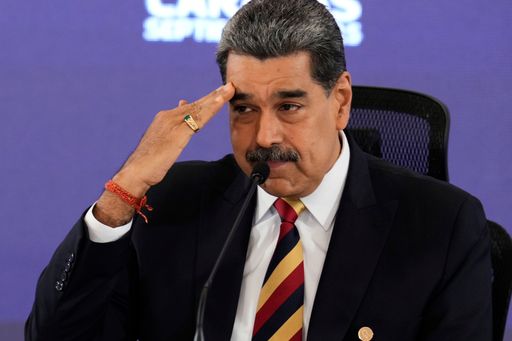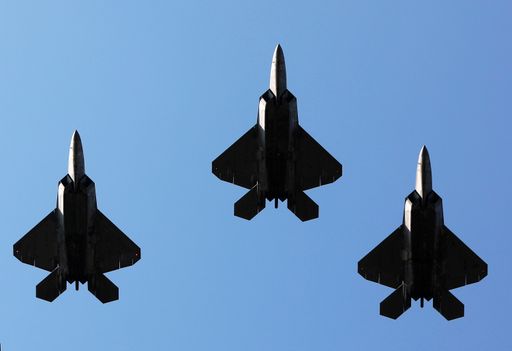Washington, DC — In the Caribbean, the US has brought a howitzer to a knife fight.
In its ongoing military campaign in the region against what it claims are Venezuela-based drug cartels, the US has executed a substantial military build-up, deploying eight Navy ships comprising missile-equipped destroyers with a range of hundreds of miles, vessels carrying over 4,500 marines, and F35 fighter jets, in the largest show of US military force in the region in decades.
And that military presence is set to expand.
The US, which alleges that Venezuelan President Nicolas Maduro heads a cocaine trafficking cartel and has offered a $50 million bounty for his capture, claimed its first offensive targeted a Venezuelan speedboat in international waters, allegedly destroying smuggled drugs and killing 11 alleged members of the Tren de Aragua gang.
The US strike on alleged traffickers is unusual; typically, drug-smuggling vessels are interdicted, and crews arrested.
US President Donald Trump has threatened to shoot down Venezuelan jets if US forces were threatened. Maduro, fearing invasion, has called for dialogue and deployed 25,000 troops to Venezuela's borders.
Analysts opine that US aims in Venezuela are less about narcotics and more about securing oil, control over the Essequibo region, and potentially toppling Maduro's government.
"The Trump administration's goals in Venezuela have little to do with combating drug trafficking. DEA [Drug Enforcement Administration] statistics demonstrate that Colombia produces far more drugs than Venezuela, despite hosting multiple US military bases, while Panama — where much of the region's human trafficking occurs — remains a close US partner," Jenaro Abraham, a political scientist and a professor of Latin American politics at Washington state-based Gonzaga University, tells TRT World.
Abraham notes that a heavily sanctioned and blockaded country like Venezuela wouldn't necessarily be a favourable hub for drug trafficking, since most of the trafficking occurs through freight.
"Instead, the real US objectives are to secure access to Venezuela's oil, gain influence over the Essequibo region, deepen involvement in mining initiatives, and expand its military presence in the hemisphere," Abraham opines.
Trump is disrupting the international order to "test reactions and exploit opportunities," he adds.

'International conflict of uncertain dimensions'
While Trinidad and Tobago lauded the US strike, advocating for the "violent" elimination of drug traffickers. Other regional leaders have reacted with greater restraint.
On Monday, Brazilian President Luiz Inacio Lula da Silva, addressing a virtual BRICS summit, said "the presence of the armed forces of the largest power in the Caribbean Sea is a factor of tension."
Colombian President Gustavo Petro, a vocal critic of US foreign policy, has denounced the strike as "murder" that "breaks the universal principles of international law."
Mexico's President Claudia Sheinbaum has opposed the unilateral US action, reiterating Mexico's longstanding position against foreign military interventionism in Latin America.
And Chile's Foreign Minister Alberto van Klaveren has voiced concern over the US military presence, stating it "worries us" and could heighten tensions.
According to Phil Gunson, a Venezuela analyst at the International Crisis Group [ICG], by placing a bounty on President Maduro, the US has transformed the situation into a conflict of "uncertain dimensions."
"By claiming that its principal adversary is the so-called 'Cartel of the Suns', allegedly headed by Venezuelan President Nicolas Maduro, placing a $50M bounty on his head and vowing to 'bring him to justice', the Trump administration has turned this into an international conflict of uncertain dimensions," the Caracas-based analyst and journalist tells TRT World.
Amidst ongoing speculation regarding Trump's actual intentions, some have posited a more malevolent objective, one that even his own supporters might oppose.
Analysts say the US could have used a more conventional approach by seizing the vessel and impounding any evidence of drug trafficking. However, its striking of the vessel, which resulted in fatalities, and the Trump administration's promise of further action amid heavy military build-up, appear to allude to a change in government in Venezuela.
"I think the goal of the United States is essentially regime change," Daniel Hellinger, a Professor Emeritus of International Relations at Webster University, tells TRT World.
"Interdiction of transnational drug trafficking may be the official policy goal, but if that were the true goal, it makes more sense for the task force to have made an effort to stop the boat, confiscate evidence, and expose any connections that might link the traffickers" to Maduro, he adds.
Hellinger suggests the operation aims to boost Trump's image as a strong leader, mirroring the Trump administration's personalist approach.
"I also think, given the personalist nature of the Trump regime, you have to say that the 'goal' of the operation was to burnish the image of Trump as a strongman ruler."
Venezuelan President Maduro has not accepted the US claim that Trump administration's operation is solely against drug cartels and not his government.
Last week, he said his country would move to a stage of "armed struggle" if it were attacked, noting that Venezuela is in an "enlistment and preparation phase."
US must "abandon his plan for a violent government change in Venezuela and throughout Latin America, and the Caribbean," Maduro added.
Maduro's Foreign Minister Yvan Gil, citing a United Nations report, recently informed his counterparts in various Latin American countries that the deployment of US maritime forces is based on a "false narrative".
According to the report, 87 percent of cocaine produced in Colombia is trafficked via the Pacific Ocean, while only 5 percent of the product is moved through Venezuela by traffickers.
Landlocked Bolivia and Colombia, with access to the Pacific and Caribbean, are the world's top cocaine producers.
'Gunboat diplomacy'
Following Venezuela's July 2024 presidential election, the political opposition has urged the US and other nations to pressure Maduro to step down.
Its leader, Maria Corina Machado, last month thanked Trump and US Secretary of State Marco Rubio for the deployment of the vessels, describing the deployment as "the right approach" toward Venezuela's government, which she described as a "criminal enterprise."
Experts posit Trump's militaristic stance could heighten Venezuelan nationalism.
"This is turning the clock back 120 years to gunboat diplomacy," Hellinger says. "And if the United States wishes to see Maduro gone, this kind of military deployment is more likely to help Maduro rally nationalist sentiment behind him."
"Gunboat diplomacy" involves using the threat of military force to influence another nation's decisions or protect its interests, often without direct combat.
The notion that a military presence in an enemy's territory weakens them has been repeatedly disproven, particularly in the case of the US. Vietnam and Afghanistan serve as examples of this.
Similarly, analysts say, drug traffickers won't have much of a problem adapting to new circumstances.
"The deployment of such a powerful and sophisticated array of military hardware against drug traffickers is of questionable value. Drug trafficking organisations are highly adaptable and will have little difficulty circumventing these obstacles despite the initial disruption of their activities," Gunson of ICG says.
He highlights concerns over the legality of the US strike and warns that pursuing Maduro's removal without the Venezuelan army's consent could trigger chaos.
"Without some form of agreement with the Venezuelan armed forces regarding a political transition, the outcome could well be violent chaos, affecting not only Venezuela itself but its neighbours," he says.
Abraham of Gonzaga University states that, from a narrow perspective, these manoeuvres could be beneficial for Trump's billionaire backers. However, this could take a toll on the US' credibility as a hegemon.
"These interventions are deeply problematic. By disregarding international law and destabilising regional politics, the US undermines its credibility as a hegemon and weakens the trust needed to maintain its global leadership," Abraham adds.

Casualties and chaos
Experts predict a bleak outlook for Venezuela and Latin America if the current situation persists, including potential civil war, guerrilla warfare, a refugee crisis, regional division, political instability, and violent demonstrations.
Hellinger suggests that direct US attacks targeting Maduro, his government in Caracas and military installations could result in a high number of civilian casualties.
"Not long ago, I think there would have been a united condemnation from member states of the OAS [Organization of American States]. With the right-wing presidents of Argentina, El Salvador, Uruguay, and Paraguay, and with the right ascending in other countries, there might be more division," he warns, adding that "this would touch off angry street demonstrations across the region."
Abraham suggests Venezuela might resist the US, outlining potential scenarios.
"Venezuela has a sizable military and millions of civilian militia members loyal to the revolution, making for a formidable resistance. In this context, Chavismo has produced a base of beneficiaries who would defend Venezuela's sovereignty vigorously," he says, referring to the political, social and economic system established by former president Hugo Chavez in 1999.
"War would also destabilise Colombia, derailing fragile peace efforts and worsening its displacement crisis. A refugee wave would undoubtedly spill over the region, adding strain to already overburdened Latin American governments."
He adds that war could embolden armed groups, potentially allowing them to seize control of rural areas, as they have previously done.
In contrast, Gunson states that Venezuela would not withstand concrete US attacks; however, he downplays the possibility of such events occurring. He warns that should this happen, it would carry the risk of sparking a civil war in Venezuela.
"The Venezuelan military would not long withstand a concerted attack by the US, but that seems most unlikely," he says.
"A split in the military, which some in the administration are openly looking forward to, carries the risk of civil war in Venezuela, a country which is also plagued with a number of armed non-state groups of various kinds, including Colombian guerrillas," he adds.
A drawn-out, low-level conflict is possible, yet the US seems unwilling to ensure internal security "in a failing state", Gunson argues.
"The potential for sustained, albeit perhaps low-intensity conflict is clear, and it is equally evident that the US has no appetite for taking on the task of guaranteeing internal security in a failed state."




















